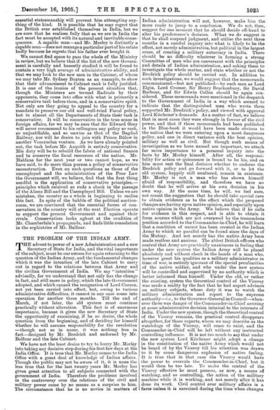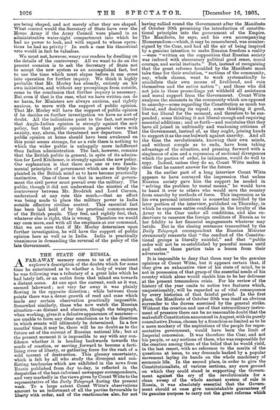tr HE advent to power of a new Administration and
a new Secretary of State for India, and the vital importance of the subject, must be our excuse for again returning to the question of the Indian Army, and the fundamental changes which it was the intention of the late Cabinet to carry out in regard to the relations between that Army and the civilian Government of India. We say " intention " advisedly, for we understand that not only has the change in fact, and still more in policy, which the late Government adopted, and which caused the o of Lord Curzon, not yet been carried into effect, but, owing to various administrative difficulties, it cannot in any case come into operation for another three months. Till the end of March, if not later, the old system must continue practically without alteration. This fact is of enormous importance, because it gives the new Secretary of State the opportunity of examining, if he so desire, the whole question from the beginning, and of deciding for himself 'whether he will assume responsibility for the revolution —though not so in name, it was nothing less in fact—designed by Mr. Brodrick and endorsed by Mr. Balfour and the late Cabinet.
We have not the least desire to try to hurry Mr. Morley into taking any decisive step during his first few days at the India Office. It is true that Mr. Morley comes to the India Office with a great deal of knowledge of Indian affairs. Though the public may not be aware of it, it is none the less true that for the last twenty years Mr. Morley has given great attention to all subjects connected with the government of India. Therefore the problems involved in the controversy over the relations of the civil and military power come by no means as a surprise to him. The circumstance that he is no novice in matters of Indian administration will not, however, make him the more ready to jump to a conclusion. We do not, then, suggest for one moment that he should decide off-hand to alter his predecessor's decision. What we do suggest is that he shall suspend judgment, and utilise the next three months in a careful inquiry into what is likely to be the effect, not merely administrative, but political in the largest sense, of creating a military autocracy in India. There should be no difficulty whatever in forming a strong Committee of men who are conversant with the principles and details of Indian administration, and asking them to investigate the whole matter, and state whether or not the Brodrick policy should be carried out. In addition to such investigations, we would suggest that the memoranda communicated—but not published—by such men as Lord Elgin, Lord Cromer, Sir Henry Brackenbury, Sir David Barbour, and Sir Edwin Cohen should be again con- sidered. These memoranda were mentioned in the despatch to the Government of India in a way which seemed to indicate that the distinguished men who wrote them supported Mr. Brodrick's policy, and viewed with approval Lord Kitchener's demands. As a matter of fact, we believe that in most cases they were strongly in favour of the civil power, and that if these memoranda had been published in the Blue-book it would have been made obvious to the nation that we were entering upon a most dangerous policy, and one in direct variance with the best opinion, military as well as civil. But though such means of investigation as we have named are important, we attach far more importance to a personal inquiry into the facts by Mr. Morley himself. After all, the responsi- bility for action or quiescence is bound to be his, and on him must rest the final decision whether to endorse the Brodrick policy and go forward with it, or to let the old system, happily still unaltered, remain in existence. Mr. Morley is not a man who has shown himself afraid of responsibility, and therefore we have no doubt that he will arrive at his own decision in his own way. At the same time, he will, we feel sure, not resent the suggestion that he should take special care to obtain evidence as to the effect which the proposed changes are „having upon native opinion, and especially upon native opinion in the Army. We believe that if he calls for evidence in this respect, and is able to obtain it from sources which are not overawed by the tremendous position accorded. to the Commander-in-Chief, he will learn that a condition of unrest has been created in the Indian Army to which no parallel can be found since the days of the Mutiny. And not merely has the native Army been made restless and anxious. The ablest British officers who control that Army are practically unanimous in feeling that under the new system the Indian Army will be placed absolutely and without check in the hands of a man who, however great his qualities as a military administrator in time of war, is entirely ignorant of the special peculiarities of the native soldier, and who under the new system will be controlled and supervised by no authority which is better informed than himself. Under the old, or rather the existing, system the theoretical control of the Viceroy was made a reality by the fact that he had expert advisers on military subjects, whose duty it was to watch the military administration and report to the supreme authority—i.e., to the Governor-General in Council—when- ever there was danger of the Commander-in-Chief arriving at some administrative decision inimical to the interests of India. Under the new system, though the theoretical control of the Viceroy remains, the practical control disappears altogether, for those experts, whom we may describe as the watchdogs of the Viceroy, will cease to exist, and the Commander-in-Chief will be left without any instructed controlling influence. It is not too much to say that under the new system Lord Kitchener might adopt a change in the constitution of the native Army which would not be heard of by the Viceroy till his attention was drawn to it by some dangerous explosion of native feeling. It is true that in that case the Viceroy would have the power to overrule the Commander-in-Chief, but it would then be too late. To make the control of the Viceroy effective he must possess, as now, a means of watching, and so controlling, the action of the military machine while it is working, and not merely after it has done its work. Civil control over military affairs is a farce unless it is exercised during the time when changes are being shaped, and not merely after they are shaped. What control would the Secretary of State have over the Home Army if the Army Council were placed in an administrative water-tight compartment into which he had no power to look, and. with regard. to whose opera- tions he had no privity ? In such a case his theoretical veto would in fact be valueless.
We must not, however, weary our readers by dwelling on the details of the controversy. All we want to do on the present occasion is to ask the Secretary of State not to accept the new system as an accomplished fact, but to use the time which must elapse before it can come into operation for further inquiry. We think it highly probable that Mr. Morley has already, entirely on his own initiative, and without any promptings from outside, come to the conclusion that further inquiry is necessary. But even if that is the case, what we have written can do no harm, for Ministers are always anxious, and rightly anxious, to move with the support of public opinion. That Mr. Morley will have the support of public opinion if he decides on further investigation we have no sort of doubt. All the indications point to the fact, not merely that Anglo-Indian opinion is strongly against the new policy, but that public opinion in general views with anxiety, nay, alarm, the threatened new departure. That public opinion at home should have been awakened on this point seems strange, for as a rule there is nothing to which the wider public is unhappily more indifferent than Indian administration. The fact, however, remains that the British public in general, in spite of its admira- tion for Lord Kitchener, is strongly against the new policy. Our explanation is that there are one or two funda- mental principles of government which are so firmly im- planted in the British mind as to have become practically instinctive. One of these is that in matters of govern- ment the civil power must prevail over the military. The public, though it did not understand the niceties of the controversy between Mr. Brodrick and Lord Curzon, understood at any rate this much,—that an effort was being made to place the military power in India outside effective civilian control. This essential fact has been laid hold of by the practical common-sense of the British people. They feel, and rightly feel, that, whatever else is right, this is wrong. Therefore we would say once more, and with all the emphasis at our command, that we are sure that if Mr. Morley determines upon further investigation, he will have the support of public opinion here as well as in India. India is practically unanimous in demanding the reversal of the policy of the late Government.
THE STATE OF RUSSIA.



















































 Previous page
Previous page